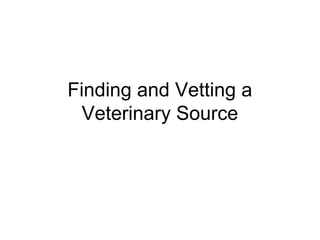Finding and Vetting a Veterinary Source
- 1. Finding and Vetting a Veterinary Source
- 3. Finding a Veterinarian When You Need a Source ŌĆó Consider asking your local veterinarian. ŌĆó Ask for a referral. ŌĆó Go to your network. ŌĆó Veterinarians with an online presence may be more likely to be willing to speak to the media. ŌĆó Do a Google search for similar articles. Who is the source or author?
- 4. Finding a Veterinarian When You Need a Source ŌĆó Board certified veterinarians: http://www.avma.org/education/abvs/specialty_ ŌĆó University hospitals: http://www.avma.org/education/cvea/colleges_
- 6. Vetting Your Chosen Veterinarian ŌĆó Do a Google search. Look for a bio and for previous online discussions. ŌĆó Check with state for licensure/disciplinary action. http://www.aavsb.org/DLR/ ŌĆó Currently practicing? Retired? ŌĆó Any publications? Where? Peer-reviewed? ŌĆó Affiliations? (AVMA, local VMA, AAFP, AAHA, etc.) ŌĆó Speaking engagements?
- 7. Vetting Your Chosen Veterinarian ŌĆó Board certified? http://www.avma.org/education/abvs/specialty_ ŌĆó Only boarded veterinarians should be referring to themselves as specialists, although other veterinarians may still be knowledgeable sources.
- 9. Reasons a Veterinarian May Not Welcome Media Attention ŌĆó Fear of negative publicity ŌĆó Fear of being misquoted/quoted out of context ŌĆó Lack of time ŌĆó Lack of confidence ŌĆó Lack of knowledge about subject matter for interview
- 10. Getting a Veterinarian to Agree to Become a Source ŌĆó Offer to do a phone interview or email interview and leave the choice up to your source. ŌĆó Offer to provide questions ahead of time, if possible. ŌĆó Be honest. ŌĆó Be flexible. ŌĆó Allow as much lead time as possible. DonŌĆÖt procrastinate.
- 12. My Information Lorie Huston, DVM ŌĆó Phone: (401)921-6369 ŌĆó Email: loriehuston@pet-health-care-gazette.com ŌĆó www.pet-health-care-gazette.com












